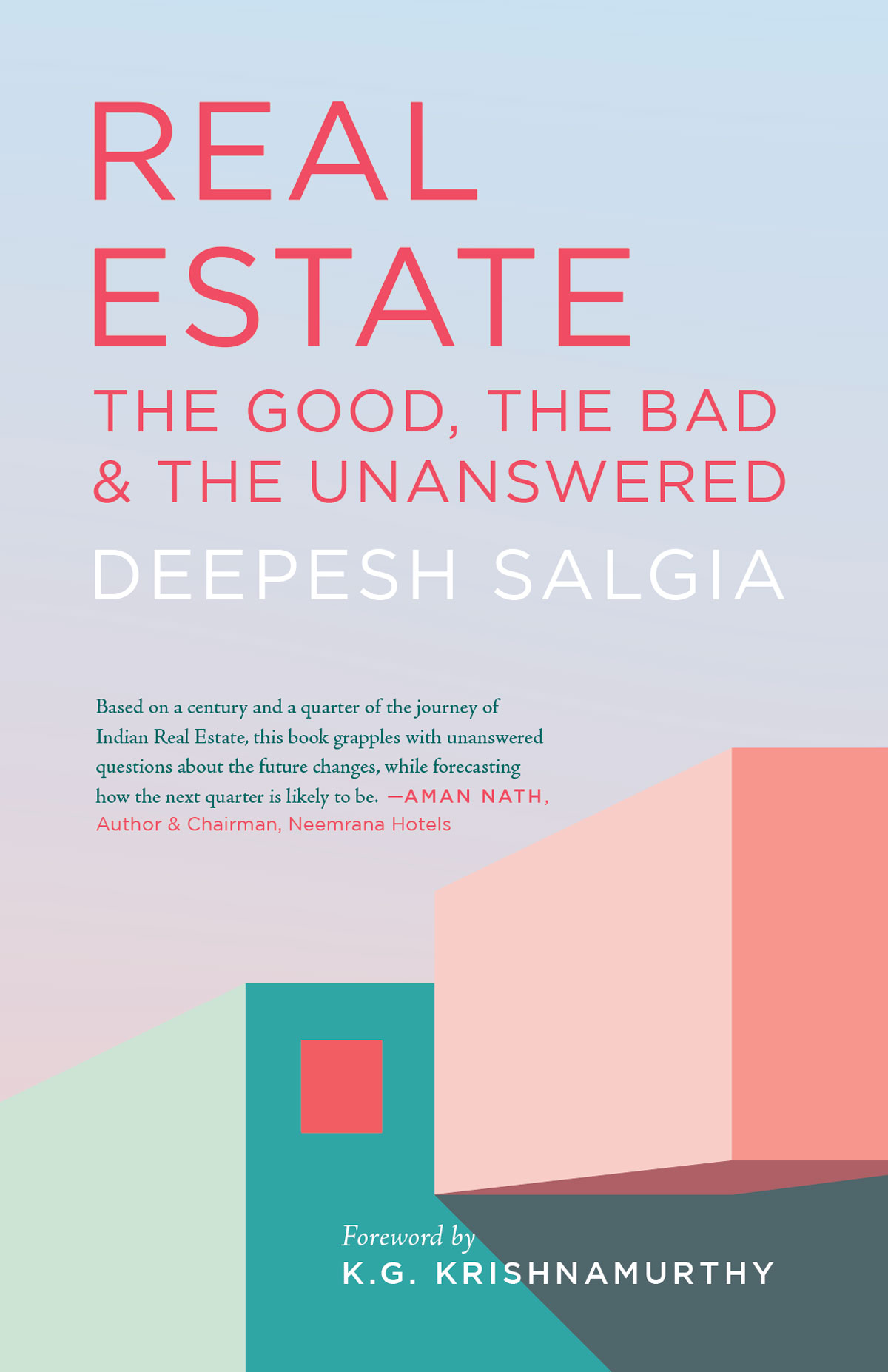
ABOUT THE BOOK

Thought Process for Times Realty
While the functioning of Cooperative Housing Societies quite often gets written about the, Disputes among the members and the malpractices of committee members but amidst this, what gets lost is the big impact the Co-op Hsc Soc Act has created over the years.
Firstly, Through creation of housing for masses and secondly and more importantly through creation of a clear definition of property rights. The latter has resulted in considerable empowerment and widening of the middle class base. And a large and stable middle class has been the single biggest factor in strengthening the democratic framework among nations across the world.
As with RERA and earlier with MOFA, Maharashtra was amongst the first states to take initiative in promulgation of the Co-op Housing Societies Act. And there an interesting
ABOUT THE BOOK
CEOs worldwide are largely products of B-schools. Yet, while the curriculum in a typical B-school would include case studies on sectors as diverse as Automobiles, Agrochemicals, Steel, Software, Manufacturing, Mining and more, rarely does it have case studies on Real Estate—often tagged as a domain of ‘dubious distinction’. While published research on Indian Real Estate is largely restricted to being just informative, analytical research is minimal and strategic research almost negligible. Set in the fictional Pinnacle Institute of Management, a B-school in Mumbai, Deepesh Salgia’s debut offering, Real Estate: The Good, The Bad & The Unanswered, artfully blends fact with fiction to narrate 125 years of the history of Real Estate in India. Through diverse formats ranging from dialogue, debates, discourses, Q&As, analyses and blogs, Salgia presents a well-researched ‘biography’ of Real Estate in India, and its future for the next 25 years.
Co-op Housing Society… a game changing act
The functioning of cooperative housing societies more often than not gets attention due to the disputes among the members. However, amidst this cacophony what gets lost is the big impact that the various Cooperative Housing Societies Acts (CHSA) and other regulations like the Apartment/Condominium Ownership Acts etc. have created by providing a clear definition of property rights.
A decco of the history is essential to appreciate the gravity of their contributions. Till late 1950s, urban housing for the middle class was restricted to tenanted premises and plotted development. Due to the geographical constraints associated with the latter, group housing projects became the optimal choice for middle class housing in metros and other large cities.
The most severe need for group housing was then felt in Mumbai. Firstly, due to geographical constraints (airport, ocean, national park etc.) and secondly due to the huge influx of migrants. Till then for most Indians, co-habitation was largely restricted to living with the people from the same community. And accordingly, we have had localities with community-based names like Sikh Mohalla, Parsi Colony, Hindu Friends Society, etc.
But influx from across India into Mumbai created a situation of completely diverse people living together. This phenomenon became one more reasons for an urgent need to clearly define rules of co-habitation as well as for property rights in a group housing scheme. This involved :
- Clearly definition of ownership rights in individual housing unit
- Delineating responsibilities of the owners (sharing common costs, upkeep of common structure etc.)
- Easy transferability of property rights and creation of mortgage
- Setting up a mechanism for settlement of disputes among owners.
Since the law-makers realised that the above was possible only through a cooperative approach among the owners, the first legal structure for ownership of property rights in a group housing scheme came through the Maharashtra Co-operative Societies Act, 1960
The landlord-tenant relationship, prevalent then, provided the middle class only with the rights to occupy and use the premises but not to have any ‘permanent’ rights like mortgage, transfer, sale, redevelopment etc. The new act addressed all these issues and created property rights for middle class which was till then a prerogative mainly of the rich and the landlord class. Thus it was a big moment in the political history of India.
Coming to NCR - the post-partition demand for housing ( largely driven by the migrants from Pakistan) was addressed mainly through plotted developments. However, the Delhi Development Act, 1958 put permanent brakes to any further role for private sector in plotted development or in group housing. Thus, DDA and unauthorised colonies remained the major source of fresh housing. Since none of the two addressed issues with respect to free transferability and clear definition of property rights we saw the dominance of parallel economy. Thus, regulations like CHSA had limited role to play. It was with the birth of Gurugram in 1980s that organised group housing came in a big way in NCR,
When Gurugram was developed, the working class was able to buy from developers a permanent legal dwelling for them which could easily be mortgaged or sold. With these sale receipts, developers like DLF were able to fund construction of offices and IT Parks which they would rent out to corporates who would employ the working class and thus enable the working class to pay for the EMIs on their borrowings from Housing Finance Companies (HFCs). Further, HFCs were able to offer fixed deposit schemes to retired people wherein they could have safe monthly income. Thus through a clear definition of property rights we had sustainable eco-system which had reliable avenues for savings, capital transfers, capital formation and employment generation. The reduced role of parallel economy provided significant gains to the government revenues.
But the story of CHSA does not end here. Besides a sustainable economic system, such Acts have also provide larger political dividends to the nation.
If US, Canada, UK, Germany, Japan and Australia can boast of a robust democratic nation, a large part of the credit goes to their strong middle class. India and Pak were created at the same time. One of the biggest reasons for the lack of a strong democratic system in Pakistan is absence of a robust middle class. In India, regulations like CHSA have been able to create property rights and thus a strong middle class. This in turn has ensured a resilient and sustainable democratic framework for the nation.
Therefore, if before flaring up petty issues among members in social media, residents of condominiums and housing societies can appreciate the larger benefits to the eco-system, it is quite likely that we will hear of housing societies more for harmony than for harassment.

Deepesh Salgia (Director, Shapoorji Pallonji Real Estate)
Deepesh Salgia, a distinguished alumnus of IIT Madras, SPJIMR Mumbai and UCLA, is presently Director at Shapoorji Pallonji Real Estate, where he has spent the larger part of his 28-year-old career. He has also worked for the Tatas and the Mahindras. Having handled a wide range of assignments in real estate; from Design to Dispute Management, Liaisoning to Land Transactions and Sales to Strategic Planning— Salgia’s forte has been problem solving in an unstructured environment. Besides his inbuilt knack for integrating ground realities in real estate with rare academic insight, this ex-IIT Bombay Maths Olympiad champion pioneered the creation of the coloured version (2004) of K. Asif ’s Mughal-e-Azam (1960). He then went on to produce an award-winning, Broadway-style musical adaptation (2016) of this classic, while providing the musical’s creative and strategic vision. Having written for most leading Indian business publications, Deepesh Salgia, an avid reader and a cinema buff, now regularly blogs and vlogs.
